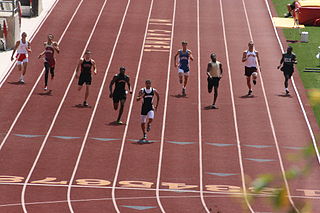
The 400 metres, or 400-meter dash, is a sprint event in track and field competitions. It has been featured in the athletics programme at the Summer Olympics since 1896 for men and since 1964 for women. On a standard outdoor running track, it is one lap around the track. Runners start in staggered positions and race in separate lanes for the entire course. In many countries, athletes previously competed in the 440-yard dash (402.336 m)—which is a quarter of a mile and was referred to as the "quarter-mile"—instead of the 400 m (437.445 yards), though this distance is now obsolete.

The 100 metres, or 100-meter dash, is a sprint race in track and field competitions. The shortest common outdoor running distance, the 100-meter (109.36 yd) dash is one of the most popular and prestigious events in the sport of athletics. It has been contested at the Summer Olympics since 1896 for men and since 1928 for women. The inaugural World Championships were in 1983.

60 metres, or 60-meter dash, is a sprint event in track and field. It is a championship event for indoor championships, normally dominated by the best outdoor 100 metres runners. At indoor events, the 60 metres is run on lanes set out in the middle of the 'field', as is the hurdles event over the same distance, thus avoiding some of the effects of the banked track encircling the venue, upon which other track events in indoor events are run. At outdoor venues it is a rare distance, at least for senior athletes. The format of the event is similar to other sprint distances. The sprinters follow three initial instructions: 'on your marks', instructing them to take up position in the starting blocks; 'set', instructing them to adopt a more efficient starting posture, which also isometrically preloads their muscles. This will enable them to start faster. The final instruction is the firing of the starter's pistol. Upon hearing this the sprinters stride forwards from the blocks.

The Diamond League is an annual series of elite track and field athletic competitions comprising fifteen of the best invitational athletics meetings. The series sits in the top tier of the World Athletics one-day meeting competitions.
The sprint medley relay (SMR) is a track and field event in which teams of four athletes compete over sprinting distances as part of a relay race. Unlike most track relays, each member of the team runs a different distance. The sprint medley is rather uncommon, run most frequently at non-championship track meets which are focused on relays. Since these are not championship events, specific criteria for the event are not in common rulebooks. This leads to localized variations.
The Four-man event of the FIBT World Championships 2015 was held on 7–8 March 2015.
The men's event of the FIBT World Championships 2015 was held on 5–6 March 2015.
The Two-woman competition at the IBSF World Championships 2019 was held on March 2 and 3, 2019.
The Four-man competition at the IBSF World Championships 2019 was held on March 8 and 9, 2019.
The Men competition at the IBSF World Championships 2019 was held on March 7 and 8, 2019.
 /
/ 



